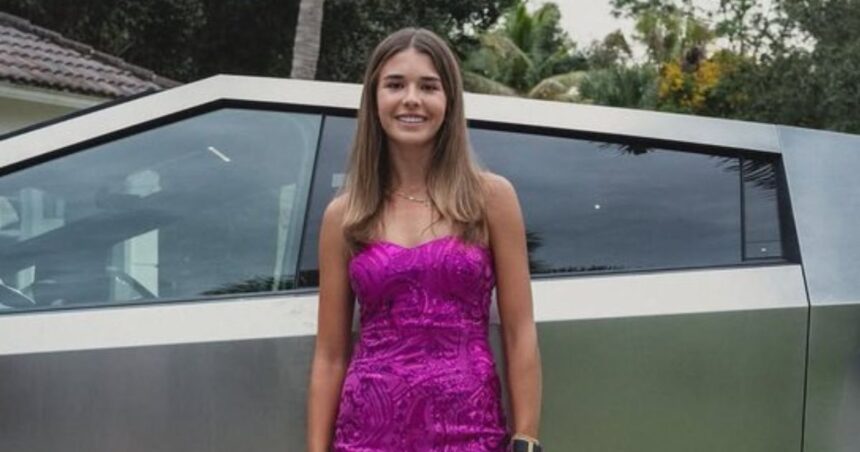High School, Security Detail, and Very Little Privacy
Kai Trump, President Donald Trump’s teenage granddaughter, recently opened up about just how strange high school can be when you’ve got a 24/7 Secret Service detail tagging along. She told her father, Donald Trump Jr., that while she understands the protection, the lack of privacy is just “tough.”
The conversation wasn’t in tabloids or on cable news—it was a real-talk moment between father and daughter that went public, reminding us that even aristocrats of the political sphere have teenage struggles.

What Kai Said Versus What the Public Hears
She’s 17, plays competitive golf, has a social media following, and is headed toward college soon. Yet her daily life includes more than grades and sports—it includes agents in suits and state-level concerns.
In the YouTube chat with her dad, Kai said, “It’s tough because you’re in high school and you want to have your privacy.” She added that although she’ll likely never have the same level of privacy other kids enjoy, she’s trying to make peace with it. She called Secret Service protection “a good thing” because “you never know what will happen. There’s a lot of wackos.”
Dad chimed in with classic parent mode: acknowledging the trade-offs. More exposure, less normalcy. Discipline vs. distance.
Between Protection and Pressure
Living under constant security isn’t just about having bodyguards. It means knowing your lunchroom isn’t private, that your gym class might have official watchers, that every public outing could be seen or recorded.
Kai is legitimate about her ambitions: college golf, visibility, being taken seriously for more than the last name on her birth certificate. But she also implicitly admits that the protection package comes with invisible costs—scrutiny, diminished boundaries, reacting not just for yourself but for what your image represents.
That’s heavy for any teenager. But especially one raised within one of America’s most monitored families.
Jesus is the Way, the Truth and the Life. Say YES if you're not ASHAMED 🙏 pic.twitter.com/Ndh6Zsdq0a
— ᶠᵃⁿ GrandDaughter (@GrandDaughterX) September 12, 2025
How Fans & Media Reacted
News outlets caught wind of the interview quickly. Headlines like “Kai admitted privacy sucks,” “Secret Service is cramping her life,” and “Trump’s granddaughter opens up” started popping.
Fans expressed empathy: high school is hard, even without your every move being watched by agents. Others were more skeptical: some noted that if you accepted a public-facing family, exposure comes with it. Some even complained that political families expect celebrity but resist consequence.
The internet, as always, is both chorus and critic.

The Wackos, Trespasses, and Real Threats
It’s not just abstract. Kai’s talk about “wackos” isn’t hyperbole. In mid-2025, trespassers tried scaling walls at Mar-a-Lago, reportedly aiming to reach or interact with Kai. Some of these efforts ended with arrests.
These incidents show why her detail exists. They also amplify the tension: security makes sense, but it’s invasive. It protects—but also isolates.
Adolescence Under a Microscope
Think back to high school: classes, friends, awkward fashion, romances, social media mistakes. Now imagine doing all that and knowing that people are always watching, possibly photographing, definitely aware of your last name.
For most teens, mistakes stay private. For Kai, even small slip-ups might become headline fodder. That creates self-censoring, maybe performance anxiety, the idea that she’s always “on.” Not exactly great ingredients for being a regular kid.

The Tools She’s Building: Strategy & Platform
Kai Trump isn’t just complaining. By many accounts, she’s leveraging her situation. Sports, especially golf, act as a stabilizer. Her social media presence is growing, with YouTube subscribers, public appearances, and visibility.
Donald Jr. has praised her discipline and described her rising visibility as something she’s treating like a business—learning skills few teenagers get at her age. She gets that the public eye is both a burden and a resource.
What This Means for Celebrity Teenagers Everywhere
Kai’s situation isn’t totally unique—celeb kids, politician kids, influencers all deal with varying levels of public attention. But her case is unusually explicit about the trade-offs: physical safety vs emotional privacy; visibility vs vulnerability.
It raises questions: How much right to privacy do children of public figures retain? What obligations do their protectors/parents have to shield them from exposure? And how do you grow up, make mistakes, and still protect your mental health when part of your audience is literal security detail?
Closing: Privacy Isn’t a Off-Switch
Kai Trump’s story reminds us of something crucial: privacy for public figures (especially young ones) is porous. It demands constant navigation.
She’s made it clear that she ‘feels’ the downside of protection. But she also sees the safety it brings. She’s balancing teenage desires for normalcy with inevitable exposure.
In a world of flashing cameras and viral clips, maybe that’s the most honest thing we can ask for: just one moment without being “on.”
Sources
-
https://nypost.com/2025/02/12/us-news/kai-trump-opens-up-about-life-with-secret-service-detail/
-
https://www.thelist.com/1960776/kai-trump-feelings-secret-service-detail/
-
https://www.yahoo.com/news/kai-trump-reflects-return-her-160915117.html
-
https://www.aol.com/trump-granddaughter-kai-admits-tough-172317272.html


